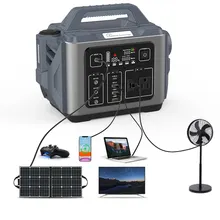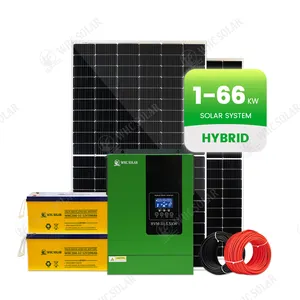What are Solar Energy Systems
Solar energy systems are a modern marvel that harness the power of the sun to generate electricity. These systems are a cornerstone for sustainable energy solutions, offering a clean and renewable alternative to traditional fossil fuels. They are designed for a broad range of users, including homeowners, businesses, and utility-scale power producers. The principle on which they operate is relatively simple: solar panels convert sunlight into direct current (DC) electricity, which is then transformed into alternating current (AC) electricity through an inverter—making it usable for residential or commercial purposes.
At the heart of a solar energy system are photovoltaic (PV) cells, which are made of semiconductor materials such as silicon. When sunlight hits these cells, it excites electrons, creating an electric current. This process is known as the photovoltaic effect. The generated electricity can either be fed into the grid, stored in batteries for later use, or used directly to power various applications. This versatility makes solar energy systems incredibly useful not only for reducing electricity bills but also for providing power in remote or off-grid locations where traditional power infrastructure may be unavailable or unreliable.
Moreover, solar energy systems come with the added benefits of low maintenance costs and minimal environmental impact. They produce no greenhouse gases during operation, contributing to a reduction in carbon footprint and helping combat climate change. For businesses and individuals alike, investing in solar energy systems translates to contributing to a greener planet while also capitalizing on economic advantages over the long term.
Types of Solar Energy Systems
The diversity in solar energy systems caters to different needs and applications, with each type offering unique characteristics and advantages:
Monocrystalline Silicon Solar Panels: These panels are known for their high efficiency and sleek appearance. Made from single-crystal silicon, they often yield a higher power output and are preferred for residential or commercial installations where space is at a premium.
Polycrystalline Silicon Solar Panels: Constructed from multiple silicon crystals, these panels typically have a lower price point and efficiency compared to monocrystalline variants. They are commonly employed in larger-scale projects where space constraints are less of an issue.
Hybrid Solar Systems: As the name suggests, hybrid systems combine solar with other forms of energy generation, such as wind or conventional grid power. These systems offer reliability and flexibility, ensuring power availability even when sunlight is insufficient.
Off-Grid Solar Systems: Ideal for remote locations without access to the power grid, off-grid systems use batteries to store excess electricity. This stored power can be used during nighttime or cloudy days, ensuring continuous energy supply.
MPPT (Maximum Power Point Tracking) Controllers: These controllers optimize the extraction of power from solar panels by continuously adjusting the electrical operating point of the modules or array.
Pure Sine Wave Inverters: These inverters provide high-quality AC power that closely mimics grid power, making them suitable for sensitive electronic devices.
Each system type can be configured with various mounting options like ground mount or roof mounting and can cater to specific applications ranging from residential homes to large industrial facilities.
How to Choose a Solar Energy System
Selecting the right solar energy system requires careful consideration of several factors:
Efficiency Needs: Depending on the available space for installation and the desired power output, one may choose between monocrystalline or polycrystalline panels. Monocrystalline panels are ideal when space is limited but require high efficiency; polycrystalline panels are more cost-effective for larger installations.
System Configuration: Whether you opt for an off-grid system with battery storage or a grid-tied setup depends on your access to the grid and your need for uninterrupted power supply.
Power Management: Selecting a controller type like MPPT ensures maximum efficiency in converting solar energy to usable power.
Inverter Compatibility: Understanding whether your application requires pure sine wave inverters for sensitive electronics or if modified sine wave inverters will suffice is important for system performance.
By carefully analyzing these factors in relation to their specific needs, businesses can find a solar energy system on Alibaba.com that aligns with their operational requirements and budget constraints.
Best Solar Energy System on Alibaba.com
Alibaba.com stands out as an expansive marketplace that connects businesses with a myriad of suppliers offering versatile solar energy solutions. With over two decades of experience facilitating global trade, Alibaba.com provides an extensive selection of cutting-edge solar products tailored to meet diverse business needs. From small-scale home setups to large commercial installations, the platform features a range of solar energy systems designed to cater to every type of application imaginable.
The assurance from Alibaba.com's Trade Assurance service adds an extra layer of security for buyers by protecting payments up until delivery completion. This highlights Alibaba's commitment to fostering trust and reliability in international trade transactions. Furthermore, by enabling communication in local languages and offering user-friendly mobile buying options, Alibaba.com makes it convenient for businesses around the world to source high-quality solar equipment efficiently.
Businesses seeking sustainable growth will find Alibaba.com's platform uniquely positioned as a bridge between suppliers' innovative technologies and their own renewable energy ambitions. With an emphasis on trustworthiness and quality assurance, Alibaba.com empowers companies to invest confidently in solar energy systems that align with their commitment to environmental responsibility and economic viability.
Common FAQs for Solar Energy Systems
What are the key benefits of installing a solar energy system for my business?
The key benefits of installing a solar energy system for a business include reducing electricity costs, decreasing dependence on grid-supplied power, enhancing sustainability efforts, and potentially increasing property value.
How do I determine the right size of solar energy system for my business needs?
To determine the right size for your solar energy system, consider your current electricity usage, the physical space available for panel installation, and the efficiency of the solar panels you are planning to use.
What factors should I consider when choosing between monocrystalline and polycrystalline solar panels?
When choosing between monocrystalline and polycrystalline solar panels, consider efficiency rates, space constraints, budget, and the overall aesthetic you wish to achieve for your installation.
Can solar energy systems be used in areas with frequent cloudy weather?
Yes, solar energy systems can still generate electricity in cloudy weather, though at reduced efficiency. Additionally, battery storage options can help store energy for use during times of low sunlight.
What is the difference between on-grid and off-grid solar systems?
On-grid solar systems are connected to the public electricity grid and can feed excess power back into it, while off-grid systems are not connected to the grid and typically rely on batteries to store electricity.
How does net metering work with solar energy systems?
Net metering allows businesses to feed surplus solar power back into the grid in exchange for credits on their utility bill, effectively reducing their overall energy costs.
What maintenance is required for a solar energy system?
Solar energy systems require minimal maintenance, mainly involving regular cleaning of the panels to ensure they operate at peak efficiency and periodic checks of the system components.
How long does a typical solar energy system last?
A typical solar energy system can last 25 years or more, with many panels coming with warranties that guarantee their performance over a significant period of time.
Are there any government incentives available for businesses installing solar energy systems?
Government incentives vary by location but often include tax credits, rebates, or other financial incentives to reduce the initial cost of installing a solar energy system.
What is an MPPT controller and do I need one for my solar energy system?
An MPPT (Maximum Power Point Tracking) controller optimizes the power output from your solar panels by adjusting its operating point. It's highly recommended for maximizing efficiency, especially in variable weather conditions.
How do I choose between a pure sine wave inverter and a modified sine wave inverter?
Choose a pure sine wave inverter if your business uses sensitive electronic equipment that requires high-quality power. For less sensitive applications, a modified sine wave inverter may be sufficient and more cost-effective.
What should I consider when deciding on the mounting type for my solar panels?
Consider factors such as local weather conditions, roof integrity (for roof mounting), land availability (for ground mounting), and whether the mounting system aligns with your business's aesthetic and spatial constraints.




































 浙公网安备 33010002000092号
浙公网安备 33010002000092号 浙B2-20120091-4
浙B2-20120091-4